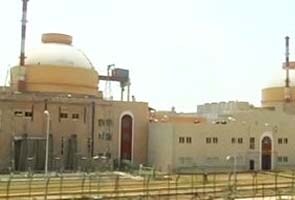
Kolkata:
The much-delayed Kudankulam nuclear power project will become operational soon, India's principal scientific advisor said today.
"The decision will come anytime now. Reactor is a safe reactor... no question about it... it is designed with safety features. It depends on the Atomic Energy Regulatory Board (AERB) to examine the test results and decide," R Chidambaram told reporters on the sidelines of the 120th birth anniversary of PC Mahalanobis at the Indian Statistical Institute in Kolkata.
"The job of the regulatory board is to examine everything they do. Nuclear Power Corp gives the results and regulatory board decides when to give the go ahead depending whether further tests are necessary or not," Mr Chidambaram said.
He also stressed on the need to convey to common people the statistical estimate of the safety of nuclear establishments.
"For all practical purposes, nuclear power is safe. Common people have difficulty in understanding probabilistic safety assessment and analysis. India has an excellent safety record... with so many years in operation... absolutely clean safety record," the scientist added.
Observing that there could be no compromise on safety, the Supreme Court recently lashed out at the Tamil Nadu government for being lethargic in putting in place a plan for the evacuation of people in the event of an accident at the Kudankulam nuclear power plant.
The apex court frowned at the attitude of the state government while hearing a petition seeking to restrain the central government from operationalising KNPP-I and II in Tamil Nadu's Tirunelveli district.
The petition said that before operationalising the units, the safety measures, including 17 recommended by a task force set up by the Nuclear Power Corporation of India Limited (NPCIL), should be put in place.
India's atomic power plant operator, NPCIL, is building two 1,000 MW reactors with Russian help at Kudankulam since 2001.
Villagers under the People's Movement Against Nuclear Energy banner have been opposing the project for the past two years, fearing for their safety, especially since the nuclear disaster at Fukushima in Japan in March 2011.
"The decision will come anytime now. Reactor is a safe reactor... no question about it... it is designed with safety features. It depends on the Atomic Energy Regulatory Board (AERB) to examine the test results and decide," R Chidambaram told reporters on the sidelines of the 120th birth anniversary of PC Mahalanobis at the Indian Statistical Institute in Kolkata.
"The job of the regulatory board is to examine everything they do. Nuclear Power Corp gives the results and regulatory board decides when to give the go ahead depending whether further tests are necessary or not," Mr Chidambaram said.
He also stressed on the need to convey to common people the statistical estimate of the safety of nuclear establishments.
"For all practical purposes, nuclear power is safe. Common people have difficulty in understanding probabilistic safety assessment and analysis. India has an excellent safety record... with so many years in operation... absolutely clean safety record," the scientist added.
Observing that there could be no compromise on safety, the Supreme Court recently lashed out at the Tamil Nadu government for being lethargic in putting in place a plan for the evacuation of people in the event of an accident at the Kudankulam nuclear power plant.
The apex court frowned at the attitude of the state government while hearing a petition seeking to restrain the central government from operationalising KNPP-I and II in Tamil Nadu's Tirunelveli district.
The petition said that before operationalising the units, the safety measures, including 17 recommended by a task force set up by the Nuclear Power Corporation of India Limited (NPCIL), should be put in place.
India's atomic power plant operator, NPCIL, is building two 1,000 MW reactors with Russian help at Kudankulam since 2001.
Villagers under the People's Movement Against Nuclear Energy banner have been opposing the project for the past two years, fearing for their safety, especially since the nuclear disaster at Fukushima in Japan in March 2011.
Track Latest News Live on NDTV.com and get news updates from India and around the world

